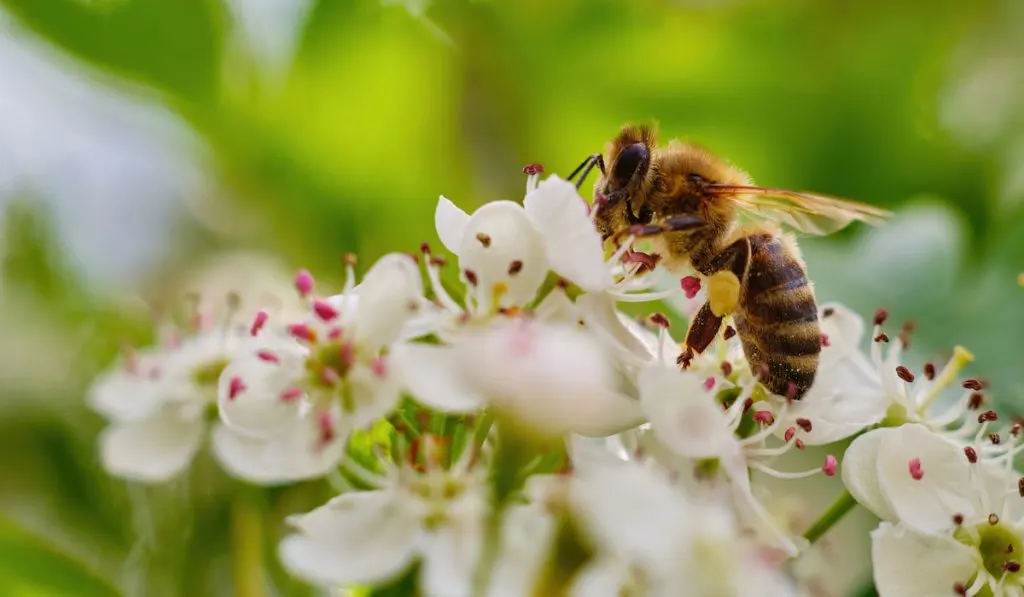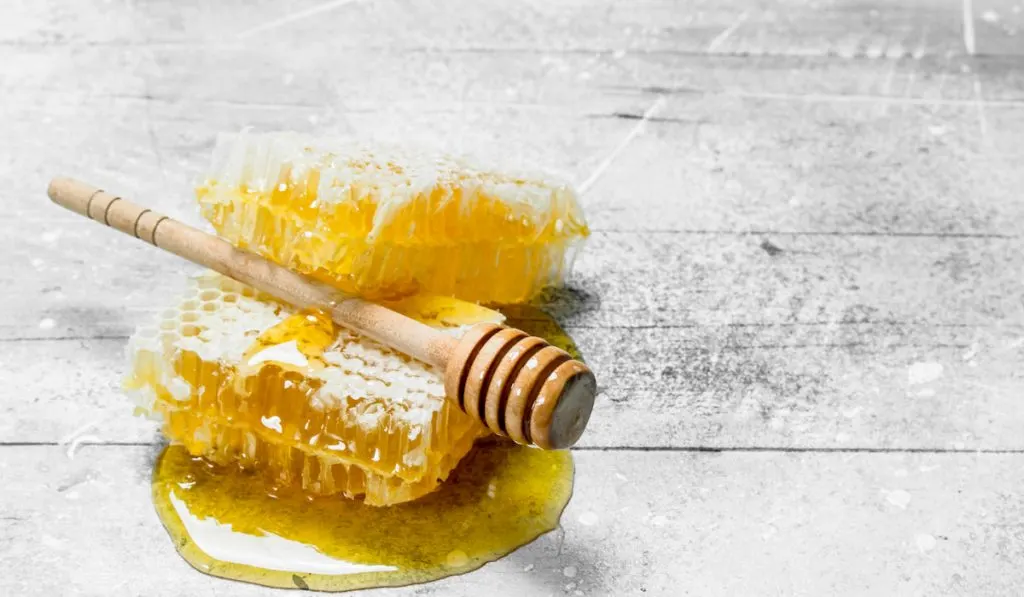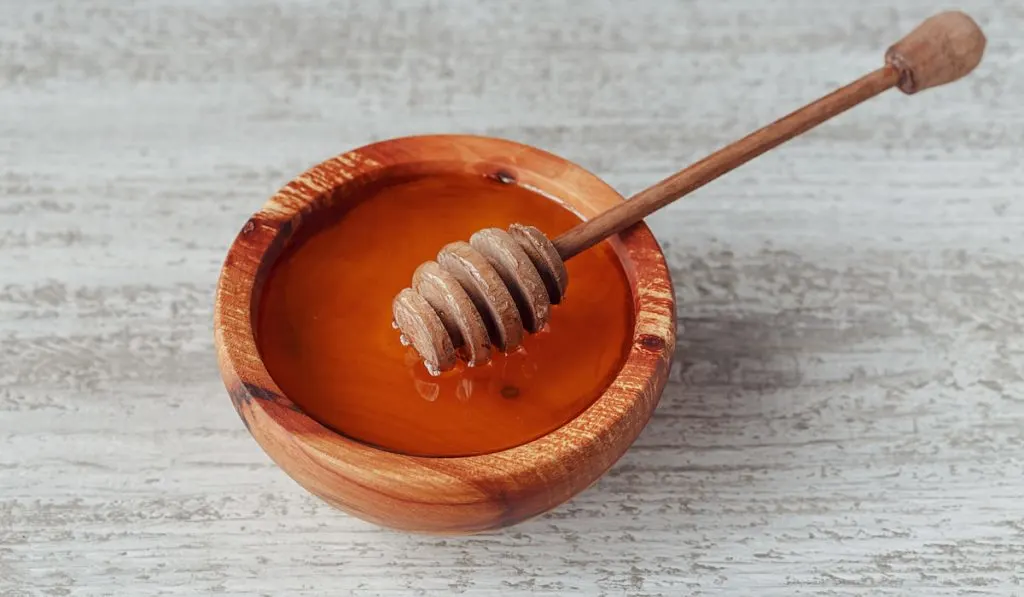*This post may have affiliate links, which means I may receive commissions if you choose to purchase through links I provide (at no extra cost to you). As an Amazon Associate I earn from qualifying purchases. Please read my disclaimer for additional details..
A lot of things we consume have properties corresponding to the sources they are obtained from. One such substance is honey.
You may find that the sweetness, color, taste, and consistency of honey differ based on its source.
In the same vein, you may find that not all types of honey are safe for consumption.
Now, you might be wondering, can honey be poisonous?
Well, yes, honey can be poisonous. It all depends on the source of the pollen used in making the honey.
Some plants produce some chemicals in their pollen, nectar, sap, or honeydew.
While bees are not affected by these chemicals, honey produced from such plants can be poisonous to humans.
Before you get nervous and discouraged from consuming honey, you should know that you are unlikely to consume poisoned honey.
We discuss poisonous honey, toxic honey, and much more in the subsequent paragraphs.

Table of Contents
Can Honey Be Poisonous?
Honey can be poisonous if bees get pollen or nectar from a toxic plant. Specific plants produce a group of toxic chemicals called grayanotoxin in their pollen, nectar, or sap. When bees pick up pollen or nectar from such plants and use them in making honey, the ensuing honey would be poisonous.
These grayanotoxins, while usually harmless to bees, are very harmful to humans.
These toxins affect the nerves. They cause a group of symptoms called Mad Honey Disease, Grayanotoxin Poisoning, or Mad Honey Intoxication.
The symptoms one experiences from a bout of Mad Honey Disease typically depends on how much one consumes.
A person suffering from Mad Honey Disease would experience symptoms like hypotension, cardiac arrhythmias, and dizziness.
It may also cause blurry vision, digestive distress, nausea, and vomiting.
In rare cases, the symptoms are severe, and people end up in the ER. But apart from that, Mad Honey Disease is usually not life-threatening.
Honey is usually poisonous only when bees get their pollen and nectar solely from toxic plants.
In cases where bees get pollen from various plants (including the poisonous ones), the honey would not be harmful.
When unsure about honey being toxic, you could start by taking just a spoonful. As we hinted earlier, the symptoms of Mad Honey Disease depend on how much you consume.
So, with as little as a spoonful, you are less likely to experience anything serious if the honey is poisonous.

Can It Turn Toxic?
It is unlikely that honey would turn toxic on its own.
The addition of some substances to honey can make it toxic. But on its own, when stored correctly, honey will not turn toxic.
If not stored the right way, honey can lose its viscosity and flavor, then become darker.
The change in qualities might give you the impression that it has become toxic. But these changes are usually harmless.
You might also get the feeling that bacteria or other microorganisms will grow in your honey over time.
Of course, if such happens, it could make honey harmful. But it rarely ever does.
Honey has a low moisture content, and microbes need water to grow. So, unless you are exposing the honey to moisture, microorganisms will not thrive well in it.
Spores of the bacteria that cause botulism may survive in honey. But they are usually not a problem for a healthy human adult.
All in all, as long as honey is stored in a covered container at room temperature, it should not turn toxic.

Does It Turn Poisonous When Heated?
Now, there is a common supposition that honey becomes poisonous when heated. But that is not accurate.
Without a doubt, heating honey will cause some chemical changes. However, it would not become poisonous.
For one, heating honey will make it darker. It can also make it lose flavor and become extra viscous.
But raising the temperature is unlikely to form a toxic substance in honey.
While heating honey would not make it toxic, doing so is undesirable.
On applying heat to honey, you denature enzymes, antioxidants, probiotics, and various beneficial substances contained in it.
It goes without saying that if this happens, honey becomes less beneficial.

Is Honey Poisonous to Dogs?
Honey is safe for dogs when consumed in limited quantities. Besides being sweet, honey has a lot of health benefits for dogs.
In larger amounts, honey could be a threat to your dog’s health.
Raw honey sometimes contains botulism spores. So, if a dog consumes too much of such kind of honey, it may get botulism.
Is Honey Poisonous to Cats?
Honey is not poisonous to cats. However, it is also not recommended for them.
While cats do not really perceive the taste of sweet things, you may give them honey sparingly.
The issue with honey in cats comes when you give them too much of it.
Honey is hard for cats to digest.
So when you give them large amounts of it, they will show symptoms of digestive unrest. Some of them include stomach ache and digestive distress.
Apart from those, the cat may also gain unhealthy weight while getting no real benefit from the honey.
Like dogs, cats are susceptible to botulism if they consume too much honey.

Is Honey Poisonous to Babies?
Honey can be poisonous to babies, especially those less than a year old.
The presence of botulism bacteria in honey can be detrimental to the health of babies. The bacteria can cause infant botulism.
The first symptom you may notice in a baby that has infant botulism is constipation.
But apart from that, you may notice weak cries, muscle weakness, drooping eyelids, paralysis, and irritability.
In any situation you suspect infant botulism, you should get the baby to the ER as fast as you can. Botulism is a potentially fatal medical emergency and should be treated immediately.
Is Honey Poisonous to Rabbits?
You should avoid giving rabbits honey.
Although honey does not contain any substance that is directly poisonous to rabbits, it is not the best for them.
Rabbits have extremely sensitive stomachs.
They thrive on diets with low sugar and high fiber; honey is just the opposite of this. So, giving rabbits honey will upset their stomach.
Upsetting a rabbit’s stomach can be potentially fatal. Since rabbits cannot vomit, they may not readily get relief from the discomfort of consuming too much sugar. Thus, they may die.
9 Plants That Make Poisonous Honey
Rhododendrons
While there are about 700 species of Rhododendrons, only a few make poisonous honey.
Two species of this family that produce grayanotoxin are Yellow Azalea and Pontic Rhododendron.

Mountain Laurel
Mountain Laurel is native to the eastern part of the United States. This plant is also called Calico Bush.
Mountain Laurel produces andromedotoxin, a type of grayanotoxin.
As expected, when honey made from this plant is consumed in large amounts, one may get the Mad Honey Disease.
Other plants that make poisonous honey include:
- Heliconia
- Yellow Jasmine
- Trumpet Flower
- Stargazer
- Amaryllis
- Oleander
- Bog Rosemary
Final Thoughts
Honey can be poisonous if the pollen or nectar used in making it is gotten primarily from certain plants.
These plants produce certain toxins in their nectar or pollen, and the toxins remain in the resultant honey.
These toxins are harmless to bees but harmful to humans. While bees can consume the poisonous honey without any issues, humans cannot.
Resources
- https://www.hindawi.com/journals/isrn/2011/526426
- https://bee-health.extension.org/are-there-plants-that-produce-nectar-that-is-poisonous-to-either-honey-bees-or-humans/
- https://www.mybeeline.co/en/p/how-honey-becomes-toxic
- https://www.gardeningknowhow.com/garden-how-to/info/can-honey-be-poisonous.htm
- https://www.ncbi.nlm.nih.gov/pmc/articles/PMC3404272/
- https://www.quora.com/Why-does-honey-get-toxic-when-heated-directly
- https://www.sleepingbearfarms.com/raw-honey-posts/heating-honey-pros-cons/
- https://siouxhoney.com/best-practices-for-storing-honey/
- https://www.thesprucepets.com/can-dogs-eat-honey-4798037
- https://www.akc.org/expert-advice/nutrition/can-dogs-eat-honey/
- https://grubbycat.com/can-cats-eat-honey/
- https://betterpet.com/can-cats-eat-honey/
- https://kidshealth.org/en/parents/honey-botulism.html
- https://www.mayoclinic.org/diseases-conditions/botulism/symptoms-causes/syc-20370262
- https://manukahoneyusa.com/honey-safe-feed-pet-rabbit/
- https://petcareadvisors.com/rabbits/can-rabbits-eat-honey
- https://www.rabbitcaretips.com/can-a-rabbit-die-from-eating-too-much/
- https://rabbit.org/fun/answer11.html
